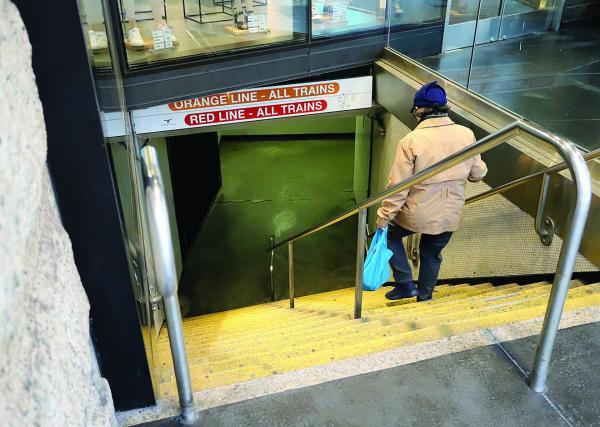December 10, 2020

The future of T service remains up in the air for this passenger and many like him. Proposed MBTA cuts include less frequent subway and commuter trains. SHNS/File photo
Mayor Walsh this week urged the MBTA to rethink its current plan to eliminate or scale back bus routes, ferries, and other services in an effort to offset a deepening budget shortfall caused by the pandemic. And Walsh’s critique— along with push-back from other elected officials and the public— seems to be having some effect.
Speaking on Monday outside of the MBTA’s Government Center Station alongside other elected officials and union leaders, Walsh urged the T’s Fiscal Management and Control Board (FMCB) and legislators to come up with a new plan to cope with a $579 million budget deficit. The board, which was set to meet on Monday, pushed back a vote on the service cuts package a week, to next Monday, Dec.14.
Walsh was pointed in his remarks: “I’m asking and demanding that the FMCB go back, sit down with the legislature and come back with an equitable plan. Cutting MBTA service will only set us back further in the commonwealth,” he said.
That same day, MBTA General Manager Steve Poftak, describing a “dynamic and rapidly developing” situation, said he would suggest deferring some critical decisions on the service cuts until February, when the agency will formally embark on its fiscal year 2022 budgeting process. Current plans, unveiled in November, call for cuts to be implemented throughout early 2021. They involve eliminating commuter rail service on weekends and after 9 p.m. on weeknights, shutting down all ferries, scrapping 25 of 169 bus routes including one that runs along Dorchester Avenue between the Ashmont and Andrew stations, and curtailing others, halting subways and buses at midnight, and scaling back more transit options as soon as early next spring.
T officials aimed the steepest cuts at routes where ridership has declined the most during the pandemic and in areas where commuters have access to alternatives, but the vast majority of the system, which was hosting upwards of 1.2 million rides a day before Covid struck, would still be affected.
All of the MBTA’s core subway lines would run 20 percent less frequently. The Green Line’s E Branch would stop running trolleys at the Brigham Circle stop in the Mission Hill neighborhood, replacing the final five stops with bus service for the fewer than 1,000 commuters who use them.
The proposed cuts, Walsh argued, would hurt essential workers that “keep the city running” and cannot opt to work from home, as well as residents with disabilities, and veterans who use the E line to access services at the VA Hospital.
“The plan will also hurt our public health and our climate, cause more crowded buses and trains and increase the spread of Covid-19, and ultimately hurt our recovery from the pandemic,” he added.
Walsh said that the Biden-Harris administration presents “a turning point in our nation. We’ll soon have a new partner in Washington who is actually talking about a federal stimulus package that will progress on the current federal funding for transit which may make the cuts unnecessary.”
At-Large Councillor and 2021 mayoral candidate Michelle Wu also called the proposed cuts “short-sighted and dangerous. The push to dismantle public transportation should be remembered as one of the biggest failures of the Baker Administration,” she said in a statement.
Mike Vartabedian, a representative from the Machinist Union District 15 and the Public Transit Public Good Coalition, cited a new report projecting that more than 800 jobs could be eliminated if the MBTA moves ahead with major service cuts.
The study, released by the Coalition, also said the job cuts would disproportionately hit Black workers living in communities with high Covid-19 infection rates like Dorchester.
“These planned cuts will hit the communities that have been hit hardest by this deadly pandemic and the workers at the MBTA who have risked everything while providing vital service,” said Vartabedian.
Lee Matsueda, executive director of Community Labor United, cited a recent survey which, he said, suggested that the cuts would result in major layoffs for MBTA employees, pushing hundreds of more people into unemployment and instability.
“It’s clear that the bulk of layoffs are likely to come from the ranks of bus and train motor operators.,” he said. “This is a group of workers that is largely non-white— 50 percent are Black and about half of them live in communities where Covid rates are above 4 percent,” he said.
“The largest groups of drivers and operators live in Dorchester where the health and economic toll of the pandemic has been among one of the most in the state— we cannot stand for this,” he added.
The T is still running pre-pandemic levels of service, but only transporting slightly more than a quarter as many customers -- and therefore collecting far less fare revenue -- than before COVID hit.
On Monday, Gov. Baker had this to say when asked about the MBTA at a press conference: “I think running empty trains and buses, as a general rule, is bad public policy.
“And I also think the decision to say that we just can’t run empty trains and empty buses over and over and over again is a perfectly appropriate response,” Baker added.


